Do You Take Cleaning Supplies To The Gun Range?
Within your computer is a lot of sophisticated hardware — your CPU, graphics card, power supply, and more. These all generate a ton of estrus. And the sensitive electrical components inside your PC are vulnerable to high temperatures. To go on heat levels down, the fans inside your computer showtime spinning to push the hot air out and absurd downwards your PC.
When putting your computer through intensive tasks — such equally while playing online video games, editing large multimedia files, or performing a CPU stress test — information technology'due south normal to take loud computer fans. And so long as they calm downward when you're done, this isn't necessarily something to worry about. Just if you're experiencing lots of desktop or laptop fan noise under normal circumstances, read on to see what the problem might be.
Why is my calculator fan running and so much?
Your computer fan might be running in overdrive for a few reasons:
-
Your fans are dingy. Dust builds up inside your reckoner, peculiarly if you've got a bulky desktop PC. As dust collects on your computer fans, they no longer work effectively. Grit and other debris are a mutual cause of noisy computer fans.
-
Your reckoner tin can't ventilate heat. The word "laptop" is misleading — when you place it on your actual lap, your legs both transmit heat to your laptop and also forestall absurd air from cycling in to cool it down. Desktop PCs likewise need access to cool air.
-
Your fans aren't working properly. Moving parts article of clothing down over time and eventually pause. Desktop and laptop fans that are running loud might be loose. At that place might also exist something incorrect with the firmware for the hardware component running the wonky fan.
-
Your CPU is working too difficult. Sometimes, it's non a fan trouble at all. If there's a plan eating up way more than than its fair share of your CPU's resources, that can easily cause your calculator to heat up fast. A calculator fan making dissonance out of nowhere can indicate a high CPU usage issue.
Is it bad if my computer fan is loud?
Loud computer fans and loud laptop fans can betoken problems, especially if the noise persists for a long menses of time. A figurer fan's job is to keep your computer cool, and excessive fan racket means they're working harder than they normally need to.
If your fans tin can't sufficiently reduce the heat levels inside your computer, you may start to feel a range of bug. Your CPU volition self-regulate its functioning to try and lower rut output, meaning that you'll see a noticeable driblet in speed and operation.
When your PC's internal temperatures become as well loftier, your CPU will shut itself downward to avert permanent damage. That's why your figurer crashes and gives you lot the notorious blueish screen of expiry. Y'all might as well feel problems while starting upwards your reckoner, such every bit a blackness startup screen or an countless series of reboots.
How tin can I brand my computer fan quieter?
There are several ways to address desktop or laptop fan racket to quiet your computer.
Each of the following tips should help clean up and boost your computer's operation considerably. Try them in social club — if i doesn't work, move onto the side by side.
1. Brand certain cool air can reach your computer
Before we become to your computer's internals, make certain you've placed your calculator in a location that helps it cool down.
Place your desktop (or laptop) estimator on a smoothen, apartment surface, such as a desk-bound or even the flooring. Don't put it on a carpeted surface, and don't go on it inside a drawer or cabinet — y'all want cool air to exist able to circulate around your computer. Y'all demand to give the hot air within your PC somewhere to get every bit your fans spin to remove it.
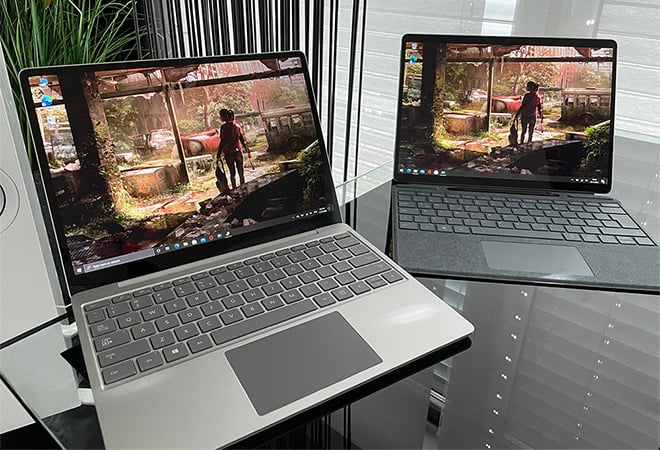 Two laptops sitting on a shine glass surface.
Two laptops sitting on a shine glass surface.
The same principle applies to your laptop. Use a laptop on a desk-bound or a tabular array, and if you must put information technology on your lap, endeavour and limit the time information technology sits there. You tin can also use a laptop cooling platform, which should have a built-in fan to blow absurd air up toward your laptop. Cooling pads likewise let you use your laptop on your lap without worrying about overheating. Only don't go out your laptop out in the sun for too long, because that will make information technology heat up fast!
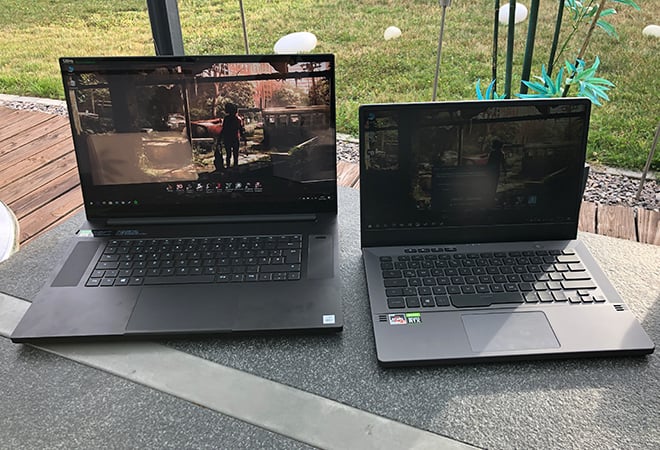 Ii laptops placed on a tabular array outside.
Ii laptops placed on a tabular array outside.
Your laptop or PC casing should have little rubber "feet" on the bottom, which allow for a bit of infinite betwixt the casing and the surface your PC is sitting on. That gap is essential for allowing your calculator to dissipate heat, so if the anxiety have worn down or fallen off, supercede them.
2. Clean your fans and vents
A loud computer fan is often a dusty computer fan. Every bit grit builds up, information technology prevents the fans from cooling your computer's sensitive internal components every bit effectively every bit they should. Regularly remove dust from the fans and vents to let your computer to cool itself efficiently.
Before cleaning your computer, turn it off and unplug all cables and connections, specially the power cable.
Selection upward a compressed air duster — likewise known as canned air — and spray it toward your computer's vents at an angle. Your goal is to blow the grit away, and non back inside your computer's housing.
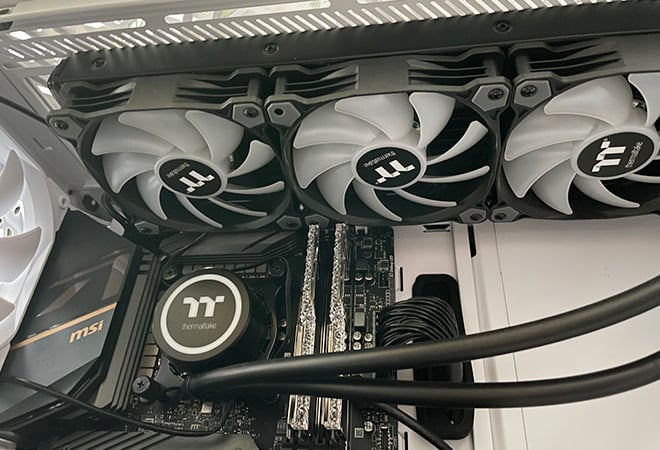 Cooling fans and other hardware within a PC case.
Cooling fans and other hardware within a PC case.
If you can, open up your estimator to straight clean your CPU fan. If you have a desktop, you lot may find other fans inside likewise, such every bit for your RAM or GPU. To remove any dust build-up, spray the fans in short bursts with your canned air, then wipe down the fans with a microfiber cloth to stop the job. If your desktop estimator has a dust filter inside, make clean this out as well.
While you're at it, clean your power supply fan with the same philharmonic of compressed air and a microfiber cloth. Power supply fans also become loud if they're also dusty to work properly. Do non open your ability supply, only clean it equally best y'all can from the exterior.
Finally, inspect the thermal paste on your CPU and any other units that have some. Thermal paste helps your CPU and GPU transfer heat to their heat sinks, and this paste can clothing down over time, condign less effective. If you find any crumbling or worn downwards thermal paste, supplant it.
Before closing up your computer, double-check that you've plugged all your fans back into the motherboard — otherwise, they won't work at all.
three. Bank check that your fans are working properly (or replace them)
Now that your computer fans are overnice and make clean, put everything back together and turn on your computer. You're looking to see whether the fans start upwardly and spin normally. If so, then y'all've done a great task — just be sure to monitor your CPU and GPU temperatures for a while to make certain everything's working ordinarily.
Simply, if your computer fans are nevertheless making noise, or if they don't work at all, it may be fourth dimension to supplant them. Bank check and confirm your fans' dimensions before ordering new ones, or else y'all may be stuck with shiny new fans that don't fit inside your PC.
While y'all can replace most fans individually, if your power supply fan doesn't work, replace the entire ability supply unit of measurement. Keen open up the ability supply can exist unsafe. As well, an overheating power supply may be unable to sufficiently power all the components in your computer. Then rather than replace the fan, upgrade to a more than powerful power supply instead.
How to keep your computer from getting so hot
Your fans tin can only practise so much to manage your computer's heat levels. If your desktop or laptop fans are still running loud after you've cleaned them, they may simply be overworked. Software problems may also be responsible for making your computer fans and so loud — either something'southward not working as it should, or your hardware isn't powerful enough to run the software you lot're using.
Older and less-powerful computers may struggle to keep upwards with modern video games — such as GTA 5, Night Souls, and Ark: Survival Evolved — equally well as other complex applications, similar multimedia editing software. Meanwhile, many types of malware can overstress your CPU.
A dedicated performance optimization tool volition ensure that your reckoner's resource are properly allocated at all times. AVG TuneUp will identify and deactivate unneeded programs so that you don't waste material CPU power on software you're not using.
AVG TuneUp will also keep your hard drive make clean and tidy by removing junk files, temporary information, unwanted bloatware, and other pointless files. An efficient figurer is a cool calculator, and a cool computer is a placidity computer.
Check Task Director for resource-hungry programs
Task Director will show you which programs are using which of your computer's resources, and how much. It'southward an easy fashion to identify resource-hogging apps that might be overheating your computer and causing all that desktop or laptop fan noise.
Later you identify the programs responsible for hogging your CPU and disk space, you lot tin uninstall or update them every bit needed.
-
Correct-click your taskbar and select Task Manager.
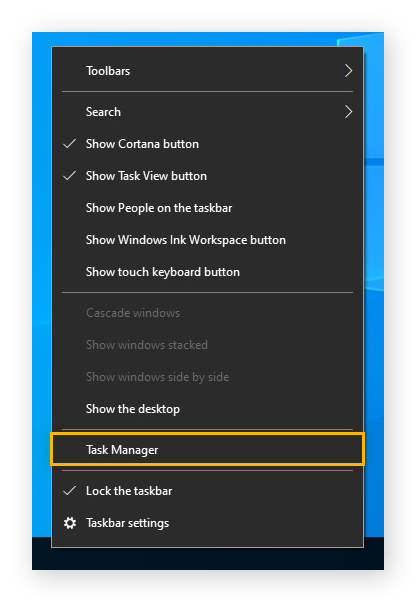
-
Click the CPU tab to sort all active processes past the percentage of your CPU they're consuming. This will place the nearly resource-demanding programs right at the top.
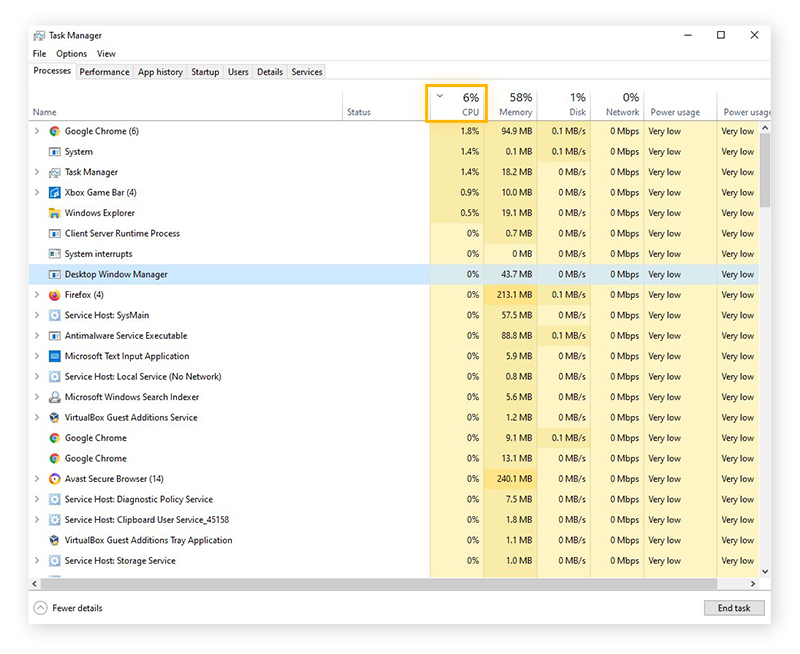
It's normal to meet some programs taking upwards large amounts of your CPU for a split second or 2. Just if y'all notice sure programs consistently sitting at the top and consuming double-digit CPU resources, make a note and deport farther research.
Updating or reinstalling the troublesome plan might help calm things downwardly and reduce your fan racket. This especially applies to your graphics commuter. If your GPU fan is making a lot of noise, update your drivers and see if the fans quiet downward.
AVG Driver Updater makes updating your drivers incredibly like shooting fish in a barrel by scanning your computer and automatically updating any outdated or malfunctioning drivers.
-
Switch to the Disk tab. This volition bear witness you which programs are taking upward the nearly storage infinite.
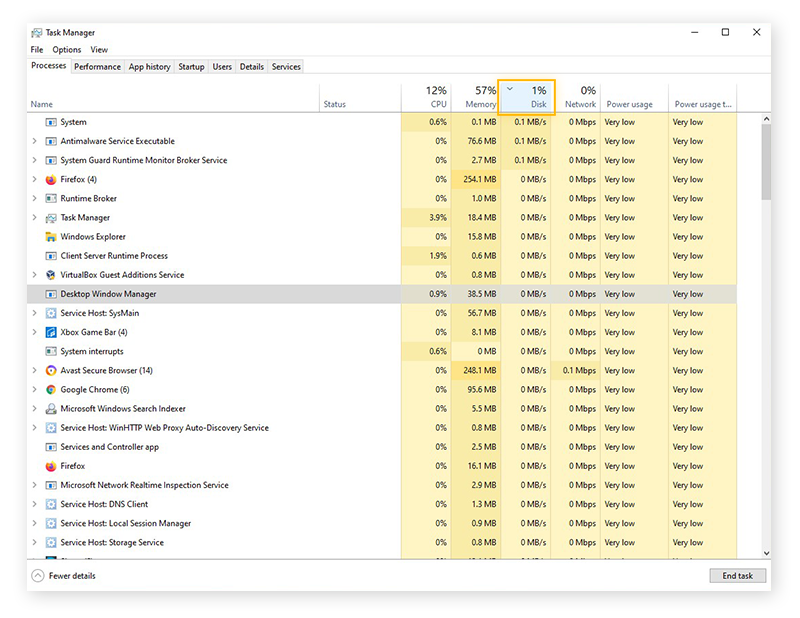
Having your computer sit down at 100% disk usage is a common cause of loud fan noise and other functioning issues. Disk usage problems can often be resolved past updating Windows, removing malware, disabling the Windows Superfetch service, or clearing out junk files with a performance optimizer like AVG TuneUp.
If you're seeing consistently loftier disk usage, run the CHKDSK system tool to diagnose any hard drive errors.
Remove and prevent malware infections
Many types of malware eat upwards big portions of your computer's resource and storage. Viruses and worms will pig both as they replicate and store copies of themselves in your computer. Adware will chew through CPU usage every bit information technology showers you in popular-upwards ads, while cryptominers — malicious programs or browser scripts that force your figurer to mine cryptocurrencies for a hacker'due south benefit — tin can cause serious overheating problems.
A malware detection and removal tool from a reputable provider is your strongest marry in the fight against resource-hogging malware. AVG AntiVirus FREE automatically scans, detects, and removes all types of malware, while also keeping y'all protected against future infections.
Without malware gobbling up your CPU ability and disk infinite, your fans will take a much easier job.
Optimize your reckoner's performance with AVG TuneUp
AVG TuneUp is a specialized operation booster that ensures your estimator always uses its resources as efficiently as possible. Here'southward how to use it to acuminate your figurer'south performance. First download and install AVG TuneUp.
Apply Slumber Mode to deactivate unneeded programs
AVG TuneUp's patented Sleep Mode feature detects programs that chew through system resources past running in the background when you don't demand them. Information technology'll hibernate these programs, and then wake them dorsum up every bit soon as yous need to utilise them once again.
That saves CPU ability and RAM for what y'all really demand and helps keep your CPU temperatures downwardly, which, in plough, makes your computer fan's job a whole lot easier.
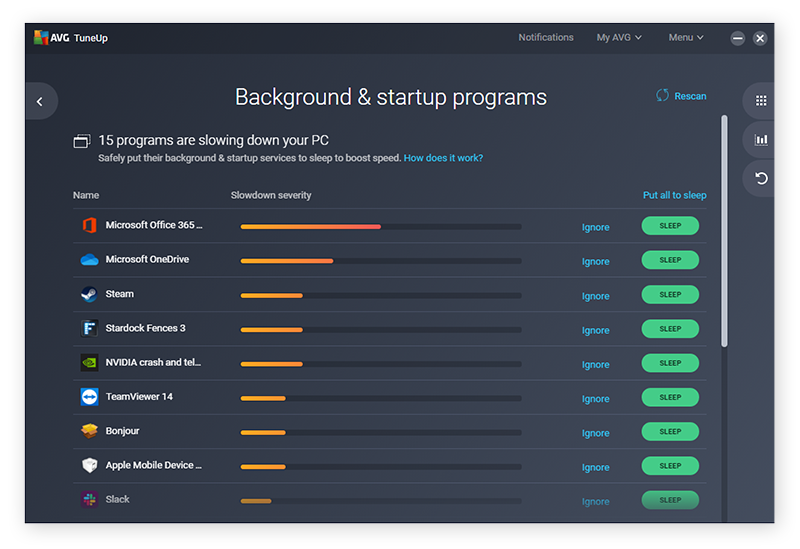
Automatically clean out junk files
Windows is constantly creating temporary files in your system as it works. If left lone, these junk files can take upwards a lot of space on your bulldoze. Deleting this junk may gear up those nasty 100% disk usage alerts and can help reduce the strain on your computer fans.
AVG TuneUp's Deejay Cleaner removes all sorts of junk files — not but temporary files, but also crash reports, enshroud files, thumbnails, unneeded install files, "recently used files" lists, and more.
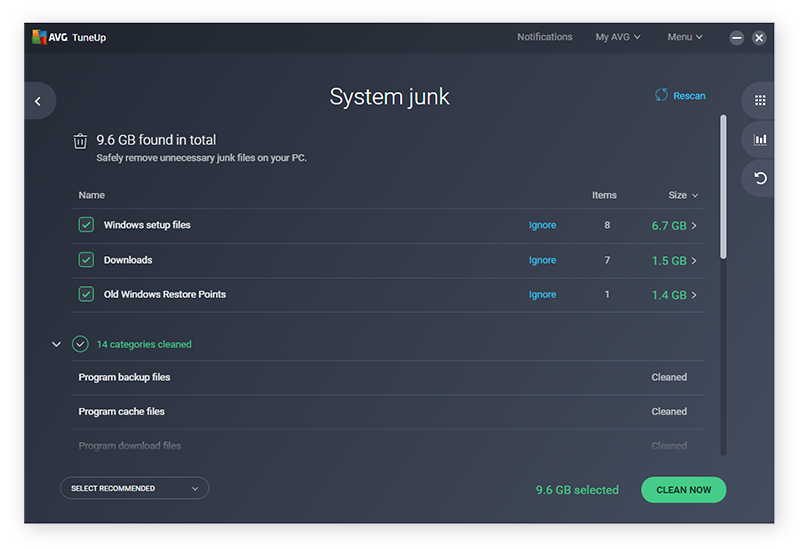
Get rid of bloatware and other unwanted programs
Bloatware refers to programs you don't want or demand, but are on your estimator anyway. These programs and other similar software tin can cause fan problems for two reasons: they can suck upwards valuable CPU processing power and occupy precious hard drive space.
A shortage of CPU power or storage space tin force your computer to work harder than it normally should, which means — you guessed information technology — loud fan dissonance. You can easily remove these apps from your computer with AVG TuneUp's bloatware removal tool.
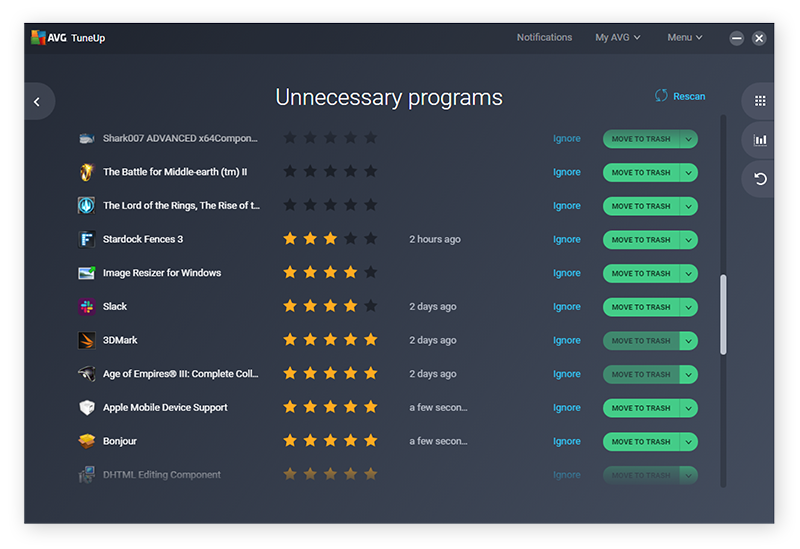
Optimize your PC's operation with AVG TuneUp
If you're overwhelming your figurer with too many resources-hungry programs and loads of junk files, it'south no wonder your fans are loud and going haywire. AVG TuneUp is a comprehensive PC optimization suite with an array of tools peculiarly designed to heave your computer's operation.
AVG TuneUp volition remove all the junk files, bloatware, and other unneeded information that'southward preventing your computer from performing at its best. And the built-in Sleep Mode will identify resource-hungry apps and send them into hibernation until you actually need them. With a more than efficient PC, your computer fans will be much happier — and quieter.
Source: https://www.avg.com/en/signal/fix-loud-computer-fan
Posted by: oakeshispers.blogspot.com


0 Response to "Do You Take Cleaning Supplies To The Gun Range?"
Post a Comment